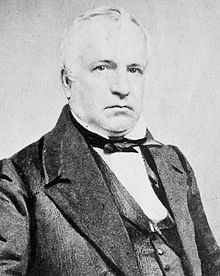Louis LaFontaine
|
Sir Louis-Hippolyte Lafontaine Bt KCMG KCSS |
|
|---|---|

Sir Louis-Hippolyte Lafontaine, Bt
|
|
| 2nd Premier of Canada East | |
|
In office September 26, 1842 – November 27, 1843 |
|
| Preceded by | Samuel Harrison |
| Succeeded by | Sir Dominick Daly |
| 6th Premier of Canada East | |
|
In office March 11, 1848 – October 28, 1851 |
|
| Preceded by |
Denis-Benjamin Papineau (deputy) Dominick Daly (as premier) |
| Succeeded by | Augustin-Norbert Morin |
| Personal details | |
| Born |
Louis Hippolyte Ménard October 10, 1807 Boucherville, Lower Canada |
| Died | February 26, 1864 (aged 56) Montreal, Quebec, Canada |
| Political party | Parti patriote, Reform |
| Spouse(s) | Adèle Berthelot, Jane Élisabeth Geneviève Morrison |
| Profession | Lawyer |
| Signature | |
Sir Louis-Hippolyte Ménard dit Lafontaine, 1st Baronet, KCMG (October 4, 1807 – February 26, 1864) was the first Canadian to become Premier of the United Province of Canada and the first head of a responsible government in Canada. He was born in Boucherville, Lower Canada in 1807. A jurist and , Lafontaine was first elected to the Legislative Assembly of Lower Canada in 1830. He was a supporter of Papineau and member of the Parti canadien (later the Parti patriote). After the severe consequences of the Rebellions of 1837 against the British authorities, he advocated political reforms within the new Union regime of 1841.
Under this Union of the two Canadas he worked with Robert Baldwin in the formation of a party of Upper and Lower Canadian liberal reformers. He and Baldwin formed a government in 1842 but resigned in 1843. In 1848 he was asked by the Governor-General, Lord Elgin, to form the first administration under the new policy of responsible government. The Lafontaine-Baldwin government, formed on March 11, battled for the restoration of the official status of the French language, which was abolished with the Union Act, and the principles of responsible government and the double-majority in the voting of bills.
While Baldwin was reforming Canada West (Upper Canada), Lafontaine passed bills to abolish the tenure seigneuriale (seigneurial system) and grant amnesty to the leaders of the rebellions in Lower Canada who had been exiled. The bill passed, but it was not accepted by the loyalists of Canada East who protested violently and burned down the Parliament in Montreal.
...
Wikipedia
